Effective communication is key no matter what situation you are in. When managing rental properties, it’s important to know how to adequately convey messages via phone, email and in all of the necessary paperwork.
There’s no doubt that face-to-face communication has decreased. It is estimated that adults spend 10 hours a day on average staring at digital devices. Conveying messages via text or email may seem like the quickest way to get a response. However, make sure you know who your audience is first.
Regardless of what platform you’re using, simple communication tips can go a long way. If you’re looking to improve your communication skills while speaking to your tenants or in any professional setting, let this guide help you.
We’re going through each of the generations below and covering communication preferences of each. Think written words versus phone calls and face-to-face meetings. Plus, we’ve provided quick communication tips that you can use in any situation.
Common Generational Names in The United States
Generations are social groups of people born in the same time frame who have similar beliefs in values, preferences, taste and cultural traits. The following five generations as listed by The Center for Generational Kinetics are:
- 1996 to now: Gen Z, iGen, or Centennials
- 1977 to 1995: Millennials or Gen Y
- 1965 to 1976: Generation X
- 1946 to 1964: Baby Boomers
- 1945 and before: Traditionalists or Silent Generation
The three key trends that shape generations are technology, parenting and economics.
Every generation paved the way for the next one. For example, baby boomers are children of traditionalists who lived through the Great Depression. Therefore, baby boomers worked really hard to get ahead and sacrificed a lot for their children to have a better life than they did. In turn, Generation X and Millennials grew up more confident and progressive.
Now that we’ve learned the different generations that exist, let’s dive into generation traits and specifics.
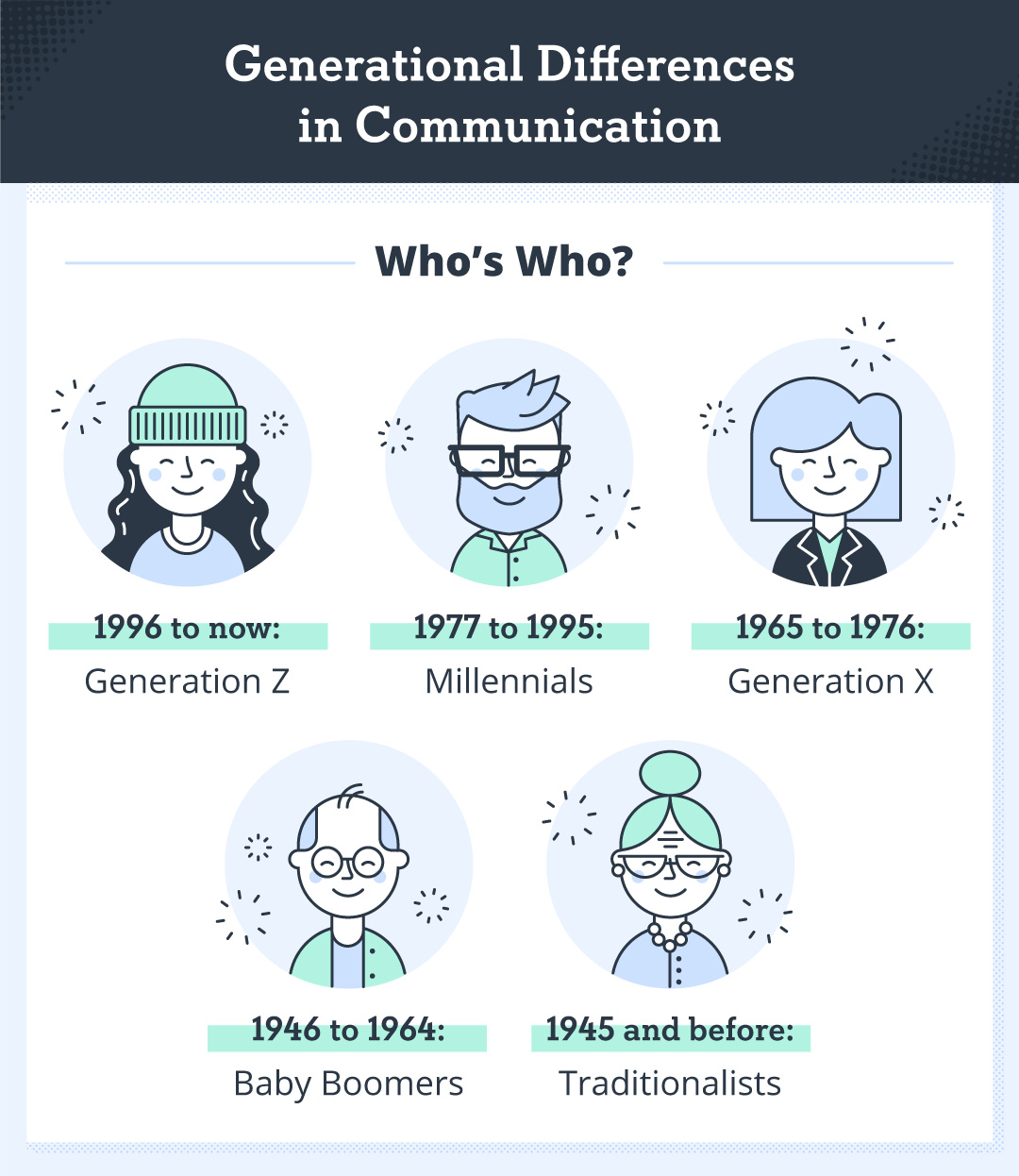
From how they grew up, events that took place during their time and their values and work ethic, these are just some of the traits that help with understanding the communication differences between generations. We’ve also highlighted their communication preferences to help you avoid any misinterpretations.
Traditionalists (1945 and before)
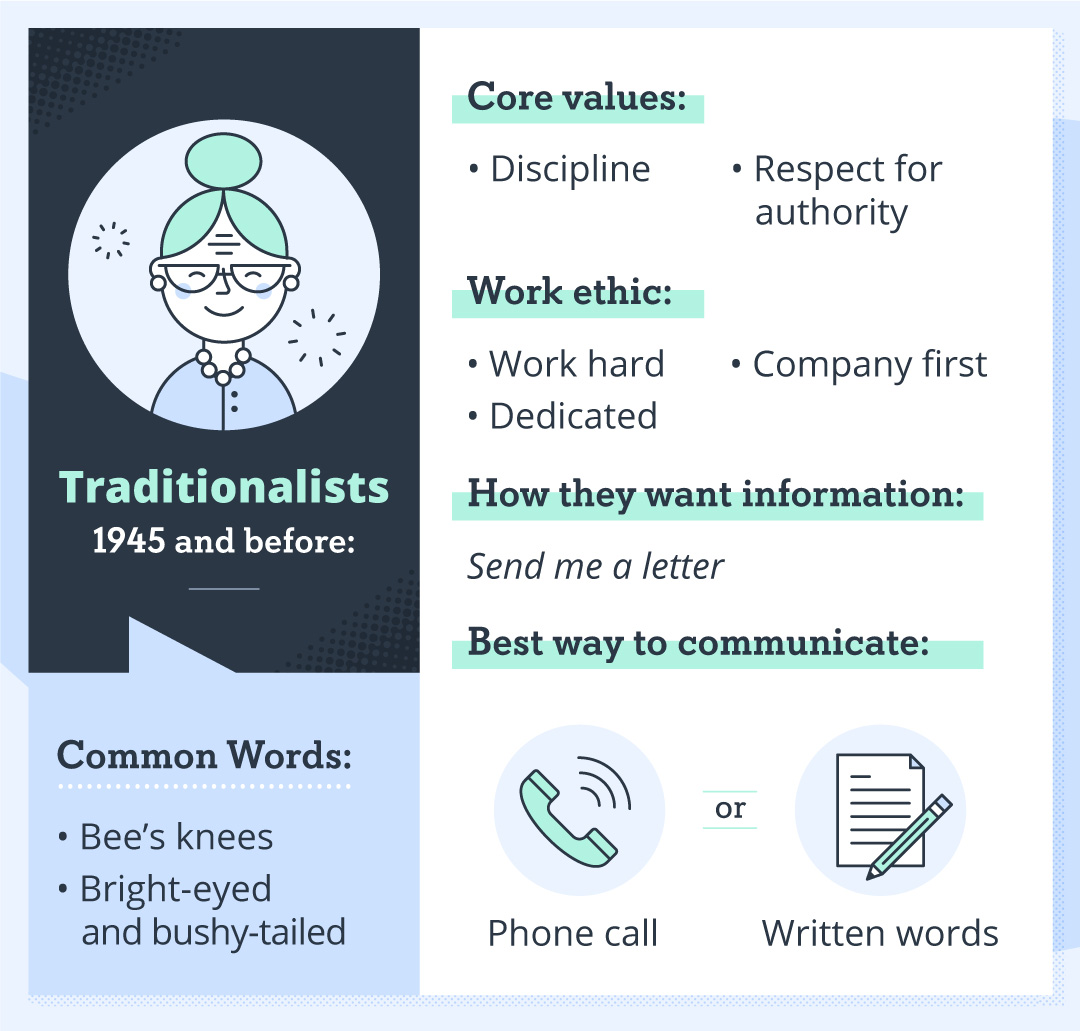
Because they believe in respecting authority, traditionalists often communicate in a command and control style. They are formal and prefer well thought out words over vague, short phrases. When speaking to a traditionalist, always make sure to respect their ideas, use eye contact and listen patiently. If there is a problem in the building or you need to relay important information prior to renting, a phone call or in-person meeting to go over paperwork is best. Don’t be surprised if a traditionalist still prefers to send money the old fashioned way in checks through the mail.
Baby Boomers (1946 to 1964)
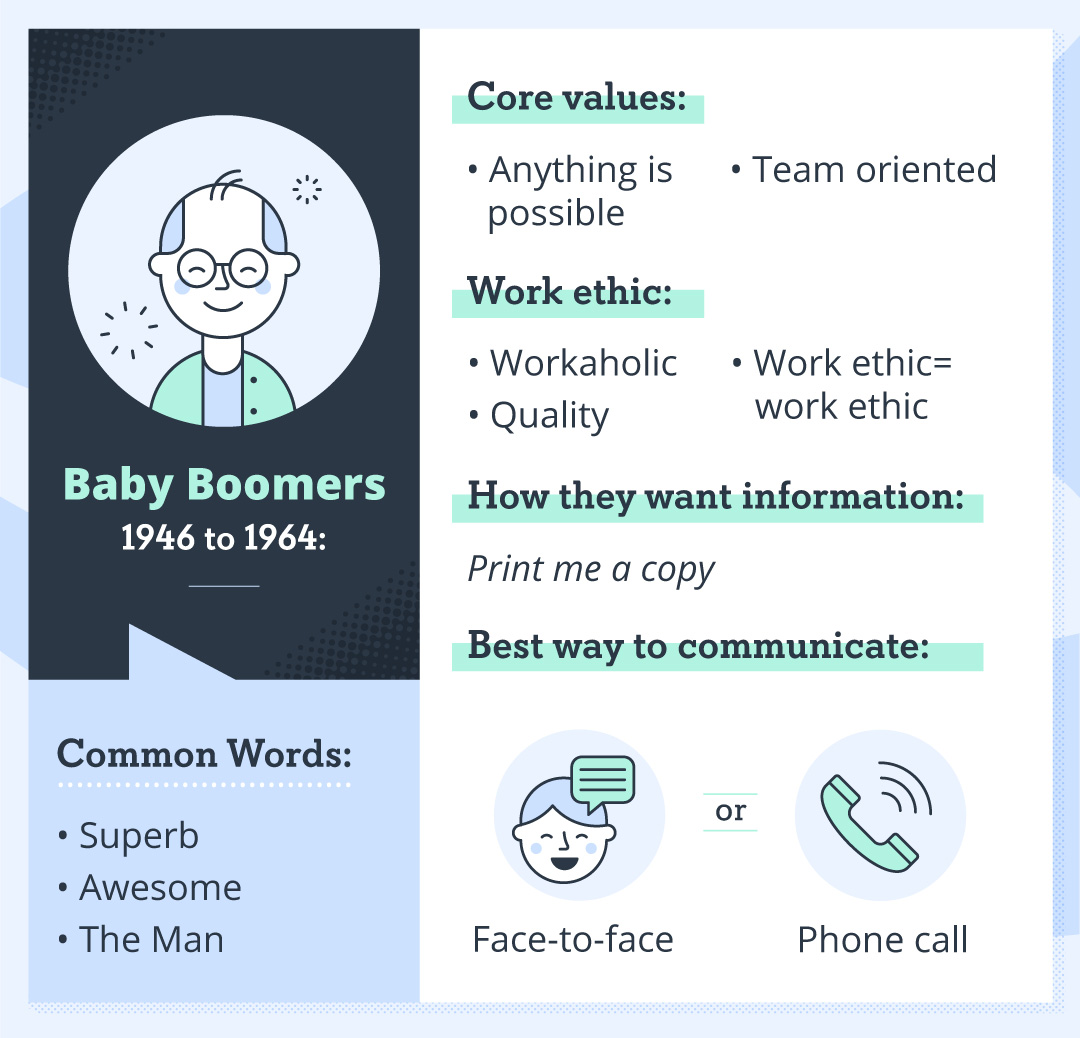
When it comes to baby boomer communication styles, one-to-one communication is key. With baby boomers, it’s best to always present various solutions to a problem. Baby boomers may often come to you with issues about their rentals and may follow up several times before they are fixed, so make sure to update them on the status of things as you go along. They only tend to speak when asked for their opinion and aren’t afraid to ask for more references and visual explanations.
Gen X (1965 to 1976)
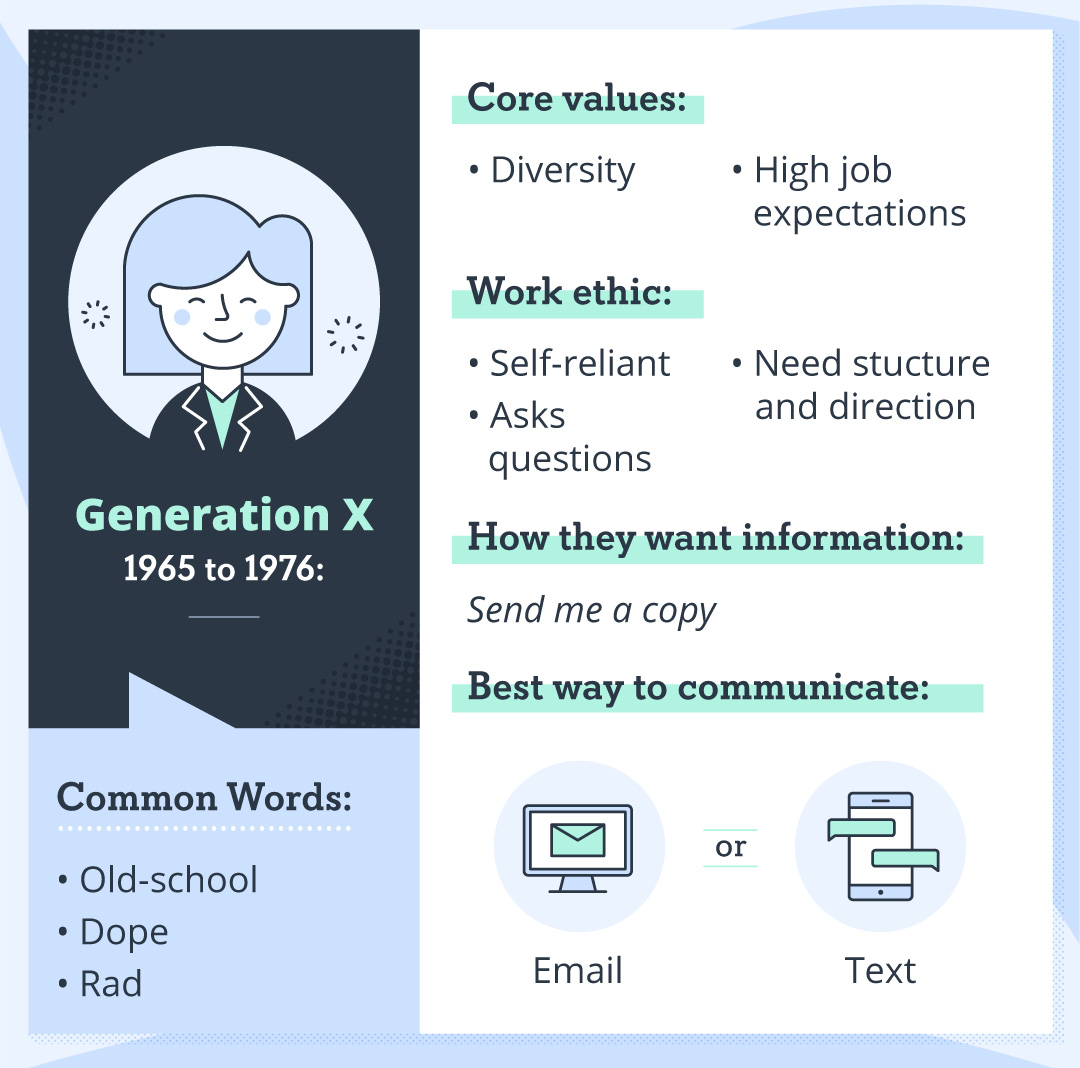
Generation Xers are a bit skeptical but extremely self-reliant. They like challenges and don’t need sugarcoating when it comes to receiving bad news so if you need to end your tenant contract, it’s best to send a detailed email. The same applies to any paperwork needed, Gen Xers prefer to take their time reading things before coming to a decision. The Generation X communication style encourages feedback and has no concerns expressing their opinion. Simply asking them how their day is when crossing paths will encourage a good tenant-landlord relationship.
Millennials (1977 to 1995)

Millennials speak freely about their goals and desires, so discussing rental agreements and responsibilities with them is a plus. When relaying information, keep in mind, millennials’ communication preferences are mostly digital. If you need any additional references or have a question regarding their application, send them a text. They will most likely respond right away or as soon as they become available. They are the first to live in a full digital world, so multitasking between conversations is quite easy for them. It’s also not uncommon to receive messages from them after 9-5 hours.
Generation Z (1996 to present)
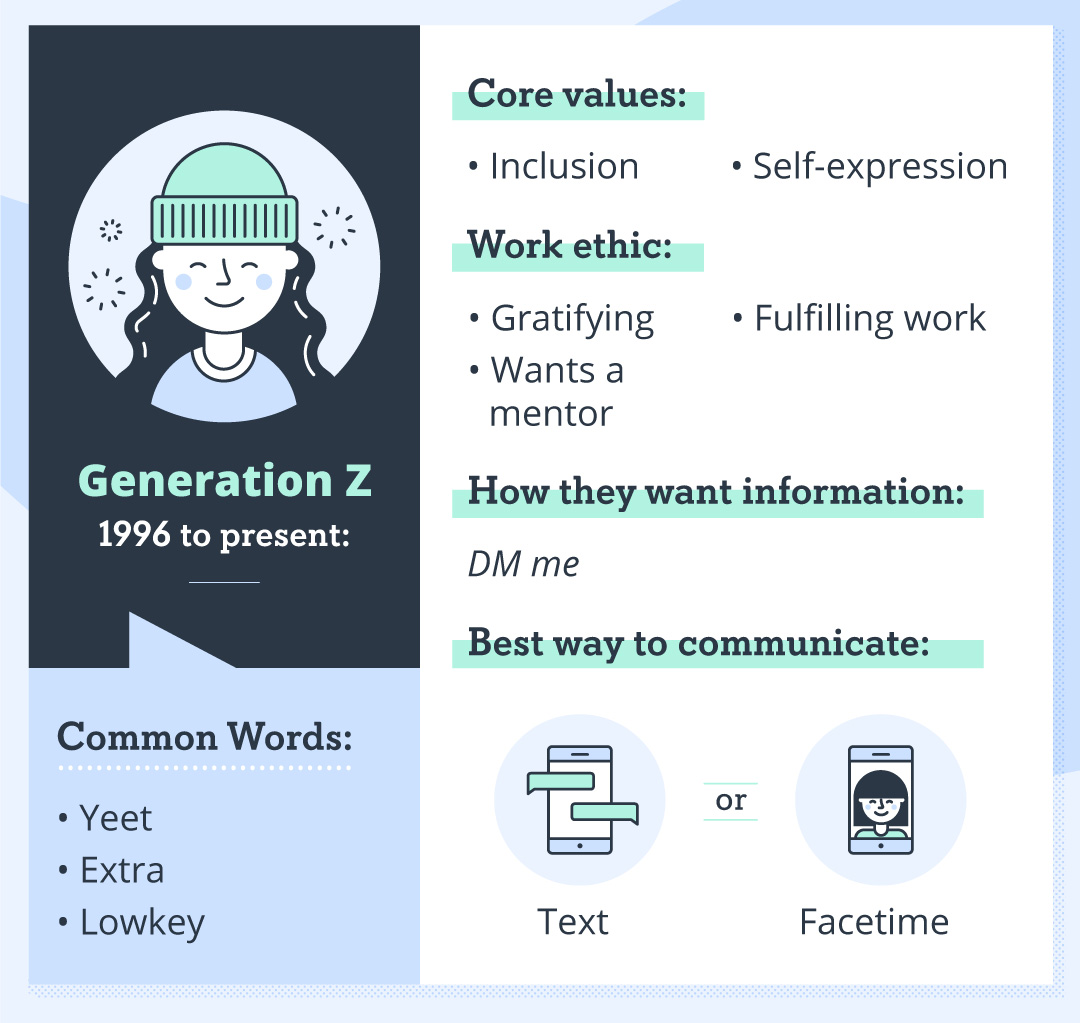
The Generation Z communication style is concise and highly visual. One very important thing to note is to be quick and abbreviate. Generation Z tends to lose interest in lengthy words or long-winded passages. While discussing rules, concerns or tenant applications, be brief and to the point. This new generation of renters expect high-end, quality living spaces and amenities like easy access to coffee shops, pools and green living.
5 Essential Communication Tips
Communication is not only about understanding the way others prefer to communicate, but improving and exercising your own skills too. Practice makes perfect!
Here are a few reminders for developing and working on your own communication skills.
Pay Attention to Body Language
One study found that 55% of communication is non-verbal. That means, the majority of what you’re saying isn’t even coming from your mouth. Your eye contact, hand gestures and body language are all sending signals. So, be aware of it. Think nodding, leaning in and sitting with your arms open to give off a relaxed and open body language.
TurboTip: Pay attention to other people’s body language. This can help you better understand what they’re trying to convey and how they’re feeling.
Practice Active Listening
Listen, really listen. Active listening involves concentrating on what another individual is saying and using different techniques to ensure you’re understanding correctly.
TurboTip: Ask clarifying questions and paraphrase what you understood. For example, “So, you are saying that…”
Be Empathetic
By expressing concern in what someone is going through you increase trust and nurture better communication.
Demonstrate that you understand what the other person is saying. Use phrases like, “I hear you,” “I understand what you’re saying,” “That makes sense to me,” to show you’re engaged in the conversation. This will make the individual feel more comfortable in the conversation.
TurboTip: Even if you disagree, it’s important to hear the other person and respect what they’re saying.
Pick the Right Method
Are you going to call, text or meet someone in person? Knowing the best way to communicate is a skill in itself.
As a rule of thumb, serious conversations are almost always better in person. You should also take into consideration the person you’ll be communicating with. Even if you don’t know them well, you can use the generational information above as a guide and ask the individual how they’d prefer to be contacted.
TurboTip: Don’t be afraid to make a note of how you’d like to be contacted too. Communication is a two way street!
Be Clear and Confident
Don’t leave any room for interpretation. Avoid jargon, fluff and long-winded sentences. Show your confidence by using eye contact and a friendly/firm tone. Convey a realistic sense of confidence to avoid being perceived as arrogant.
TurboTip: Bonus points if you avoid ending statements as a question.

3 Common Causes of Miscommunication
Understanding the specifics of each generation and working to improve your own communication skills can help avoid (you guessed it!) miscommunication.
Miscommunication leads to fights and misunderstanding. One may think that because we now have so many ways of communicating, it may be easier. But the truth is, it may actually make getting your message across more difficult due to the following things listed below.
- Generational gap: What is the generational gap? It means that two people can have different opinions in actions, beliefs and tastes solely based on the fact that they come from different generations, thus causing conflict and communication complications.Consider the generation you’re communicating with when deciding where to send your message and take a look at our tips below.
- Written vs. verbal: It’s often difficult to gauge tone in written communication. For example, a simple written “no” can be taken as angry or negative while a verbal “no” can actually be friendly.
- Assumptions or jumping to conclusions: Listen carefully and ask questions if needed. Try the active listening techniques above and paraphrase what you understood from the conversation.
Putting all of these tips to practice is the best way to find out what works for you. Below are some examples of “what was said” vs. “how it should be said” to help you better understand the communication tips above.

By using this comprehensive guide on communication, you are well on your way to establishing better relationships and more effective conversations. Whether you’re inviting a renter to apply online, screening tenants or behind a computer figuring out the best way to notify a renter that you require renters insurance, one thing that’s certain is, communication is key.
Keep these tips in mind when tenant screening. It can come in handy, especially if you have any concerns regarding their application. Take this guide to generational communication tips with you by clicking the button below.








